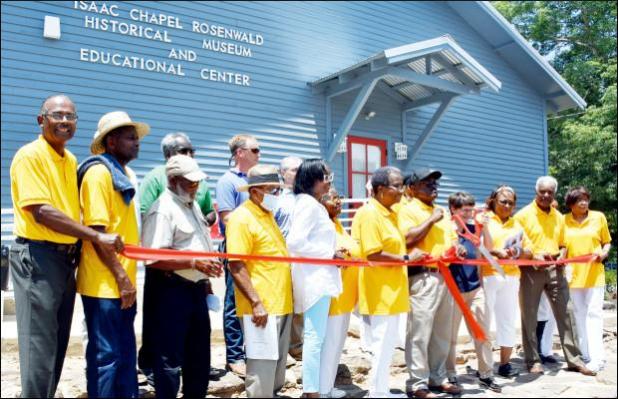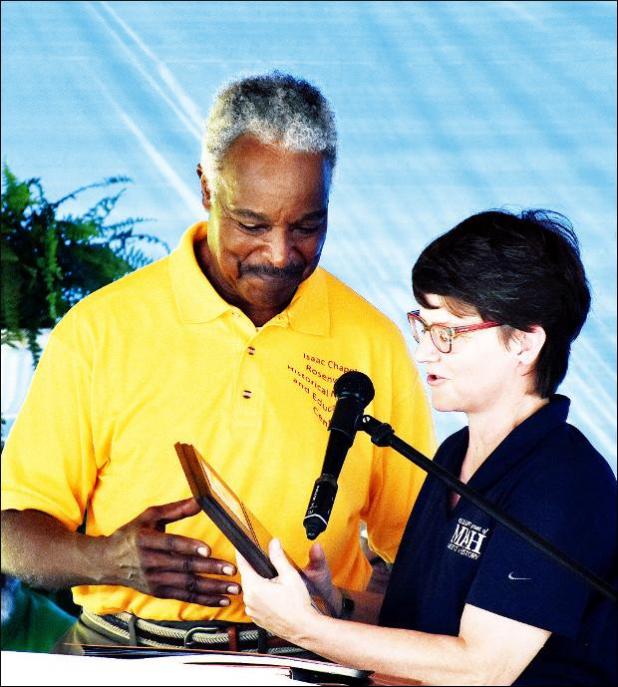
Photo by Estelle Whitehead RosenwaldSchool restored
Members of the Rosenwald School restoration committee and friends gathered for a ribbon-cutting ceremony Friday, July 8, following a program celebrating the restoration of the facility. Those in the lineup included committee members, elected officials and representatives with Mississippi Department of Archives and History, the agency funding the project

Photo by Estelle WhiteheadWilliam Sidney Payne, Jr., presents a plaque of appreciation to Jennifer Baughn, with the Mississippi Department of Archives and History that funded a grant to restore the facility.
Isaac Chapel reborn
A long-awaited day arrived. Isaac Chapel Rosenwald School, one of fewer than 20 Rosenwald Schools that educated African Americans in the early to mid 20th century, has been restored. It will now be used as a museum and an educational center.
A ribbon cutting celebrating the reopening of the school held Friday, July 8 drew 400 guests. Some 40 people worked to preserve the school at 3752 Highway 309 South for both historic and future uses.
“Isaac Chapel has been reborn,” said Kevin Doddridge, CEO of Northcentral Electric Cooperative, which is providing high speed broadband to the facility.
Rosenwald Schools, supported by the Rosenwald Foundation, were built in the 1900s to equalize the opportunity for an education for African Americans during the days of segregation in Mississippi where public schools for Blacks were underfunded.
District 4 supervisor George Zinn III spearheaded the effort to preserve Isaac Chapel which was in an advanced state of neglect.
He said the restored structure “grabs a piece of history and preserves it for generations to come.”
Many of those in attendance at the ribbon-cutting ceremony were students of Rosenwald schools or the descendants of students.
One such person is William Sidney Payne Jr., who began his education at the Isaac Chapel School and served as chairman of the Rosenwald committee. The committee did a yeoman’s job of finding funding, establishing a nonprofit status, and overseeing the restoration and future plans for the facility.
“Our hope is that the museum will help others experience the arduous past of education that Black people endured in order to simply acquire a public education,” Payne said. “It will also encourage an appreciation for the importance of education that is essential in our ever-changing world.”
Zinn said following the committee’s failure to get funding for its first grant, he encouraged the committee, saying, “We can do it, work hard and everything will work out.”
While the building was being restored, committee members traveled about learning how museums are built and operated.
Zinn said he will always be grateful for the Julius Rosenwald Foundation for the building which now reminds the community that the state doctrine of “separate but equal” made segregation legal. The doctrine made segregation of schools legal, but education for Blacks was not equal, Zinn said.
The restored facility will offer classes in science, technology, engineering, arts and math.
“Today is a great day. We are making history,” said Terry Moore who serves on the board of directors for the non-profit.
Charles Terry, speaking on behalf of the Marshall County Board of Supervisors, reminded the community of the effort it takes to move a project forward.
“In order to finish, you have to get started,” he said. “Thank you for your passion and dedication in order to get this project. Zinn was at work behind the scene to always keep the building intact.”
He called Zinn a Sharpie.
“Once he gets something in mind, it’s hard to erase it,” he said. “You have brought history back to life…to educate and teach people the history of this facility.”
Doddridge, speaking extemporaneously, said before a thing can be done, you have to be grateful.
When he was asked if Northcentral would provide broadband, Northcentral became very excited, he said.
“It was a challenge to us to focus on this area and to do remote work,” he said.
State Representative John Faulkner, who praised the local delegation for paving the way for the project, said “pride and satisfaction follows work well done.”
The project represents both history and a step into the future, he said.
Following the supreme court sanctioning of separate but equal doctrine, most states provided for schools for Whites but neglected African American schools, he said.
“Today is a new chapter in history. Today, we take a giant step into the future,” Faulkner said.
He acknowledged the local delegation’s participation in getting $100,000 for the site in 2021 and $200,000 in the 2022 legislative session.
“It’s not what we accomplish for ourselves that counts, but the foundation we give for future generations,” he said.
Christopher Hill, principal of Byhalia School, Irene Turnage, superintendent of the Holly Springs School District and Carrie Skelton, superintendent of the Marshall County School District and Ivy Taylor, president of Rust College all expressed their excitement for the work to preserve the history of African Americans and pledged their support of future educational programs at Isaac Chapel.
Taylor said Rust is investing in facilities, a new curriculum, community outreach and partnerships.
“My message to young people is to cherish the opportunity for education - something no one can take away from you,” she said.
Turnage said there is always friendly competition in athletics, but when it comes to our children, “there is no barrier between us to help our children in Holly Springs and Marshall County.”
Jennifer Baughn, keynote speaker from the Mississippi Department of Archives and History, spoke of the long journey of five years the restoration committee took to complete the project.
A phone call from George Zinn III in 2015 got the ball rolling.
Baughn said, as archives historian for five years, she has traveled the state to find projects worthy of saving.
Starting with over 500 Rosenwald schools built in Mississippi, under 20 are extant, she said.
In 2017, during pouring rain, Baughn drove to Isaac Chapel to meet with the Rosenwald Committee, expecting to find few if any to show up.
A surprising 40 plus group of people were there to discuss the future of the building and what would be required for it to have a life of its own.
She said the generosity of Julius Rosenwald and Booker T. Washington is preserved because of the amazing efforts of the community.
Citing her dad’s favorite scripture Proverbs 11:24, Baughn completed her comments with the words:
“There is that scattereth, and yet increaseth; and there is that witholdeth more than is meet, but it tendeth to poverty,”
Marshall County and the Isaac Chapel Rosenwald committee and partners celebrated the accomplishments of the community — that scattereth, and yet increaseth — Friday, July 8, at 11 a.m. with a big tent celebration and renewed commitment to education for all.
The board of directors of the project include: William Sidney Payne Jr., Gwendolyn Nichols, Dorthy Jones Stigall, Terry King Moore, Carl DeBerry, Robbin Zinn, Beverly Jones-Cobb, Roberta Barnes, Delia Reid, Dwight Wheeler and John Perry.

